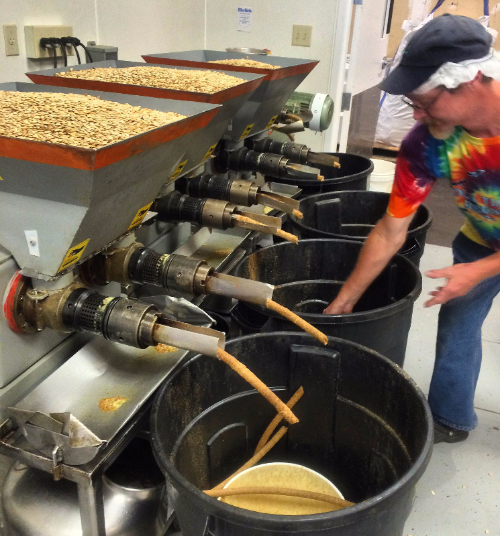In the Styrian region of Austria, locals use pumpkin seed oil like Italians use olive oil. That is to say, a lot: about a liter a month. In Austria the oil is such a big deal that they grow pumpkins just for their seeds. The pumpkin itself is a byproduct that gets discarded on the fields to be used as fertilizer. (The harvest is actually kind of incredible to watch, if you’re into watching vegetable harvests that involve an enormous spiked wheel that looks like it could be a medieval torture device.) I’d guess, though, that 300 years ago, when Austrians first started pressing the seeds for oil, they were just looking to find a use for a part of the plant that would otherwise be thrown away.
That’s the story behind Greg Woodworth’s butternut squash seed oil. Working in the finger lakes region of upstate New York, Greg makes his oil using seeds from non-GMO butternut squash from Martin Farms, near Rochester, New York. Martin Farms grows and processes squash to sell it in those trays of cubed squash you see in the produce section at the grocery. A decade ago, all of the seeds left over from the processing were tossed on the compost heap. Today, Greg and his team of five roast and press those seeds to make a luscious, nutty oil—one that any Austrian would recognize.
You gotta roast the seeds. Here’s why.
First off, roasting helps to dry the seeds. Raw squash seeds contain a fair bit of moisture. If there’s too much water left in the seeds when they’re pressed, the process of grinding them up to extract the oil will create a mushy sludge that gunks up the press. The second reason is that more oil can be extracted from the seeds by pressing them while they’re hot from the roaster, without needing to add any chemical solvents—common additives used in the extraction of most nut and seed oils. “More” oil is relative, of course. Fifty pounds of seeds makes one gallon of oil. To put that another way, it takes ten squashes worth of seeds to press enough oil to fill one 6.3-ounce bottle.
The third and biggest benefit to roasting is flavor. Roasting brings out the nutty, rich flavors in the seeds. This is a big difference from other oils, like olive oil. With olive oil, you want to avoid adding any heat to the olives during pressing because it can destroy the subtle aromas of the olives. For the squash seeds it’s the opposite. Think of baking up a batch of pumpkin seeds after carving a jack o’lantern—after roasting, the seeds develop a deep, toasty flavor with lightly sweet, caramelized notes.
Those toasty, roasty, nutty flavors are huge in this oil.
When you open a bottle of butternut squash seed oil, it smells as if peanut butter was a flower, with a hint of sweetness like caramelized squash when it just comes out of the oven. The flavor is silky with sweet squash notes at the beginning and a big nutty richness. Writing in the Wall Street Journal, Sara Dickerman called it “a haunting and hard-to-place taste—hints of apricot, chanterelles, a soupcon of peanut butter.” I think my favorite description, though, comes from one of my colleagues, who described it as tasting like “melted butter and toasted nuts had a baby.”
Butternut squash seed oil is the foie gras of finishing oils—a drizzle over a finished dish adds a huge, rich flavor boost.
The oil is an outstanding complement to vegetables like roasted Brussels sprouts, sauteed green beans, or wilted spinach. It makes for an excellent vinaigrette with lemon juice or a cider vinegar; try using it to dress a salad of greens, avocado, blue cheese, and walnuts. It’s killer splashed atop grilled fish, scallops, chicken, or pork. You could pour a glug onto a bowl of creamy cauliflower or squash soup. Mixing the oil with a bit of honey makes a great sweetener for oatmeal or crepes. It even makes a good topping for a dish of vanilla or chocolate ice cream. Austrians would sprinkle it over cooked beans or roasted meats. Or you could use it the way Greg did at first: as an ingredient in baked goods, like quick breads or cookies. Wherever you use it, the rich, nutty intensity lingers for a long, long time.

